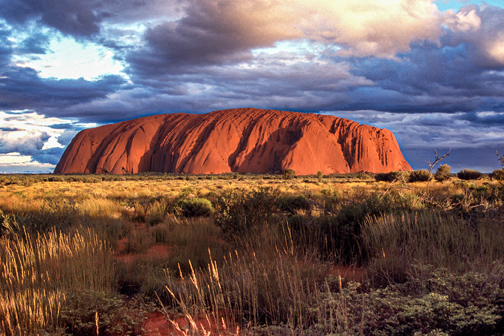
Crossing the last water barrier
N 23°57'20.5" E 143°29'14.4"
Day: 165-166 Stage three / total expedition days 556-557
Sunrise:
05:42-05:41
Sunset:
18:38
As the crow flies:
28,3 u. 21,4
Daily kilometers:
32 u. 30
Temperature - Day (maximum):
35°-38° degrees, sun approx. 55°-58°
Temperature - Night:
11°-18° degrees
Latitude:
24°06'17.0" u. 23°57'20.5"
Longitude:
143°21'11.6" u. 143°29'14.4"
Thomson River & Hardie Sitzhöcker Camp – 10/28/2002 – 10/29/2002
Before we load Istan, I take a look at his ulcer, which has worsened again due to the days of rest. I rub the area carefully with the special cream and can only hope that it will help again. Fortunately, Jafar’s ulcer has not grown. His sensation of pain has decreased, which suggests that he has survived the mulga wood poisoning.
We leave Camp 222 and follow the Tonkoro Ban Ban Road again. “The cattle seem to look better here,” I say, pointing to a few animals. “Yes, I don’t think the vegetation in this area is as scorched by the sun as the land we’ve crossed so far,” Tanja replies.
We proceed without any special events. We come across a car every few hours. One of the drivers introduces himself as Angus. “I heard about you on the radio. It’s a fantastic trip. If there’s anything I can do to help you, I’d be delighted,” he says. “We’re off our maps because of a detour to Westerton. Do you know when we’ll be near a watering hole?” I want to know. “You are welcome to fill up with water here. You are very welcome to refresh yourselves and have something to eat,” he offers us in a friendly manner. We explain that we have to use the time in the morning to walk and therefore decline. “I can understand that. But you’ll be crossing Lochern National Park in a few kilometers. There’s a beautiful waterhole on the Thomson River. As far as I know, enough bushes and plants grow there for your camels.” “Sounds very good. But what about the national park? Do you think we can cross it?” “But of course. I’ll drive past the park ranger anyway and let him know.” “Wonderful,” I say happily, because under normal circumstances it is strictly forbidden to bring dogs and other animals into national parks.
A little later, we cross the dry, wide riverbed of the Vergemont River. “This is the penultimate water barrier. If we leave the Thomson River behind us soon, the coming summer rains won’t be able to seal us off from the outside world. I don’t think it will rain here in the next few weeks, but you never know,” I explain, because two years ago the Channel Country suffered the worst flood disaster in 50 years. Absolutely everything was separated from the outside world. Some stations were isolated for months and had to be supplied with food from the air. This flood would have been far more dangerous and worse for us than the current drought. Water in this form is absolutely destructive. Especially for two people, a dog and six camels.
In a good mood to cross the Thomson River today, we head east. After 32 kilometers we are dead tired but happy to have finally reached the waterhole at the Thomson River. Immediately after unloading, I lead Sebastian to the waterhole, which is more like a small lake. “Come on! Come on! Tucker time! Tucker Tiiime!” I shout to entice the other five boys. It doesn’t take long for them all to wobble after each other like ducks and follow Sebastian and me. They know their food call and know that something tasty is waiting for them. When they discover the large expanse of water, they start jumping like exuberant children. Thirsty, they reach the shore one after the other and fill their bellies. We are not the only visitors to the natural waterhole. Hundreds of birds sit on the banks or in the nearby trees. Pelicans swim on the lake and look over at us in amazement. Kangaroos drink in large groups on the opposite bank and a few wild boars try to escape. “It feels like paradise here,” I say dreamily, gazing across the vast expanse of water that has never dried up since the white man arrived in Australia. “It’s paradise,” answers Tanja.
35°-38° degrees, sun about 55°-58° / at night 11°-18° degreesIn the evening the park ranger and Angus visit us with their families. Angus and his wife surprise us with a box of fresh vegetables and eggs. “From my own garden,” he says with a laugh. We thank the families for their precious gifts and introduce them to our camels. Our visit lasts until sunset. When they leave, we have to hurry to find some firewood to boil water for our dinner. Exhausted, we don’t move into our camp beds until 8 p.m. today.

